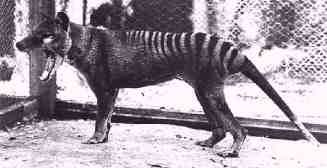
|
|
|

|

|
|
|

|

|
Modern sightings, so far unconfirmed, come from all three of these areas in surprising quantities. In Tasmania, these sightings have even been upheld by footprints that seem authentic, and thylacine tails in an advanced state of decomposition. In Indonesian New Guinea, sightings have been reported as recently as the 1990s, with witnesses pointing to thylacine photos when asked to choose which animal looks like their native dobsegna. Locations known for sightings of the Indonesian dobsegna are Gunsung Lorentz National Park and Mount Giluwe.
In Tasmania, loggers are reportedly trying to thwart recognition of living thylacines by poisoning large areas whenever sightings are recorded, in an attempt to keep environmentalists from shutting down their logging operations. This allegation has convinced many people that it is best for thylacine witnesses to keep silent, if they want the thylacine to survive.
Queensland Tiger
The Queensland tiger is not supposed to be an actual feline, instead it is a marsupial equivalent to a feline, a case of parallel evolution. It is no more a tiger than the thylacine is a wolf. The Queensland tiger (also called the "marsupial tiger" the "yarri" and the thylacoleo) is supposed to have become extinct on the Australian mainland many thousands of years ago because of competition with introduced wild dogs, the dingoes. Both native folklore and modern sightings claim that a few Queensland tigers are still alive, in small pockets in the most remote areas of northern Queensland's rainforests.
The Queensland tiger looks cat-like, generally with a striped pelt. Unlike the thylacine, the stripes are darkest and most prominent towards the front of the body, not the rump. In reports, the Queensland tiger can have golden coloration or it can be dark gray. The Queensland tiger is generally thought to be about the same size as a big dog. It actually looks rather similar to the thylacine except for its cat-like head, so it may be that sightings of "thylacines" from mainland Australia are really of the Queensland tiger. It has also been suggested that the Queensland tiger (or other supposedly extinct marsupial look-alikes to felines) are behind the persistent reports of mystery cats living in the Outback of Australia, cats that are supposed to be native residents, not feral pets, and that reportedly do not resemble house cats or any other known species of cat.
| You can find out more about the Thylacine and Queensland Tiger from the following sources: |
Beresford, Quentin & Bailey, Garry. Search for the Tasmanian Tiger.
Clark, Jerome and Coleman, Loren. Cryptozoology A-Z. New York: Simon & Schuster, 1999. Page 206-207, 238-239
Clark, Jerome. Unexplained!. Detroit: Visible Ink Press, 1999. Pages 365-373
|
Coleman, Jerry D. Strange Highways: A Guidebook to American Mysteries & the Unexplained. Alton, Illinois: Whitechapel Productions Press, 2003. Page 185
Crewdson, Michael & Mittelbach, Margaret. Carnivorous Nights: On the Trail of the Tasmanian Tiger.
Darben, Peter. The Queensland Marsupial Tiger
Godard, Philippe & Guiler, Eric. Tasmanian Tiger: A Lesson to be Learnt. Perth, Australia: Abrolhos Publishing, 1998.
Hynes, D. The Quest for Thylacoleo
Keel, John A. The Complete Guide to Mysterious Beings. New York: Doubleday, 1994. Pages 41-43
Owen, David. Tasmanian Tiger: The Tragic Tale of How the World Lost its Most Mysterious Predator.
Moggycat. Anomalous Felids
Myotis, Mr. Mysterious Marsupials
Newton, Michael. Encyclopedia of Cryptozoology: A Global Guide to Hidden Animals and Their Pursuers. Jefferson, North Carolina: McFarland & Company, 2005. Pages 16, 31, 47-48, 69, 97, 134, 172, 176, 318, 323, 390, 449-451, 458, 460, 479, 483, 498-499, 504
Paddle, Robert. The Last Tasmanian Tiger. Cambridge: Cambridge University Press, 2000.
Shuker, Karl. The Beasts That Hide From Man: Seeking the World's Last Undiscovered Animals. New York: Paraview Press, 2003. Page 282-283
Weidensaul, Scott. The Ghost with Trembling Wings: Science, Wishful Thinking and the Search for Lost Species. New York: North Point Press, 2002. Pages 11, 229-279
Wikipedia, The. Marsupial Lion
Wikipedia, The. Thylacine
Wikipedia, The. Queensland Tiger
The text on this page is copyright 2005 by Jamie Hall. Please use proper citation if you are using this website for research.